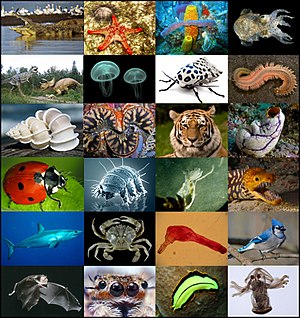
Animals refers to the over one million species on planet Earth, many of which are known but many as yet unknown. Human beings are animals but often consider themselves apart from animals. Humans have always sought to classify animals to assist with identification and to group animals into kinds.
Animals include mammals, birds, reptiles, protozoans, sponges, corals, jellyfish, worms, molluscs, arachnids, insects, water bears, sea urchins, starfish, fish, and more.
Categories of animals[edit | edit source]
In terms of their relationships to humans, there are two categories of animals:
- Wild animals - which participate in their respective ecosystems with little to no human interaction. (However, they are often impacted by human activities, increasingly encroaching on habitats.)
- Domesticated animals - which have been raised, and often selectively bred for human purposes. There are three main types:
- livestock - raised for their meat, milk or other food products, including chickens, cows, honey bees, and some kinds of fish;
- working animals - used to help humans with various tasks, including draft horses, guard dogs, and messenger pigeons;
- pets (also known as companion animals) - which provide humans companionship or a hobby, such as dogs, house cats, goldfish or guinea pigs.
There are also feral animals whose lineage has been effected by humans, and who may have been socialized to humans, but who live on their own with little to no interaction with humans. Hence, feral animals could be seen as a transitional phase from domestication back to the wild. Invasive species are another consideration with respect to animals, in that human beings have introduced animals, either knowingly or unknowingly, into environments that they are not native to and subsequently become a problem for local species of animals and plants, and ecosystems.
How humans treat wild animals[edit | edit source]
Humans can take various stances toward wild animals. Some of these include:
- Observation: Often humans avoid direct interaction with wild animals, but enjoy observing them from a distance. Sometimes these animals are captured and placed in zoos.
- Rescue: Injured animals may be taken to an animal rescue shelter, where they can be rehabilitated and returned to the wild.
- Stewardship: Some human beings consider that they have a role of stewardship toward animals and can intervene to protect and assist animal survival in beneficial ways.
- Killing or removing animals: Sometimes humans take adversarial stances toward wild animals. This often happens when the wild animals impact peoples' livelihoods, such as wolves killing sheep. Hunting is another common practice, whether done for the purpose of harvesting meat or simply as a hobby ("for sport").
- Indirect impacts: Human activities can also have an indirect effect on animals. These include the wholesale destruction of habitats and ecosystems such as draining wetlands, or razing rainforests for the purpose of creating cattle pasture. Pollution also has an impact on animals, like fish ingesting plastic particles in the Great Pacific Garbage Patch and ingesting plastics in the form of microbeads from cosmetic products that cannot be filtered out by city water systems.
- Causing extinctions: Direct and indirect human pressures have even caused entire species of animals to go extinct.
Beneficial interactions with animals and humans[edit | edit source]
In permaculture, designers seek to maximize the number of beneficial interactions of both wild and domestic animals within a design site. This can include attracting predator birds or snakes to control pest rodent populations, or attracting pollinator birds and insects.